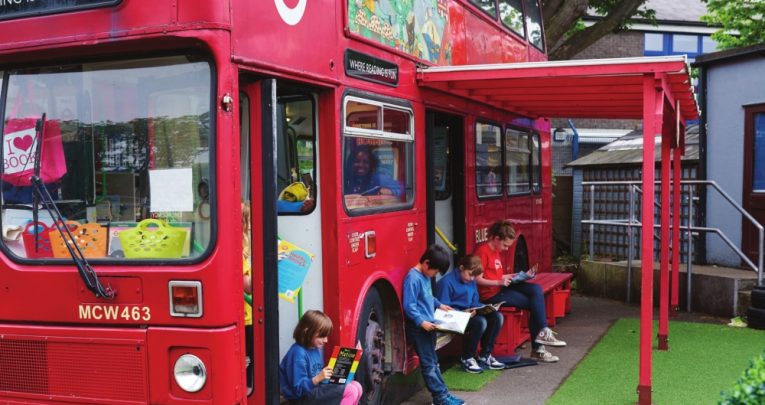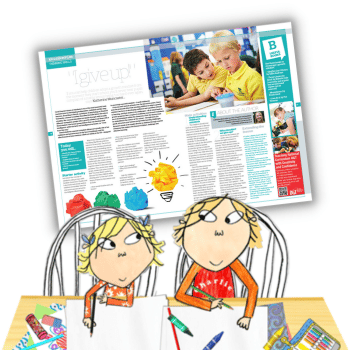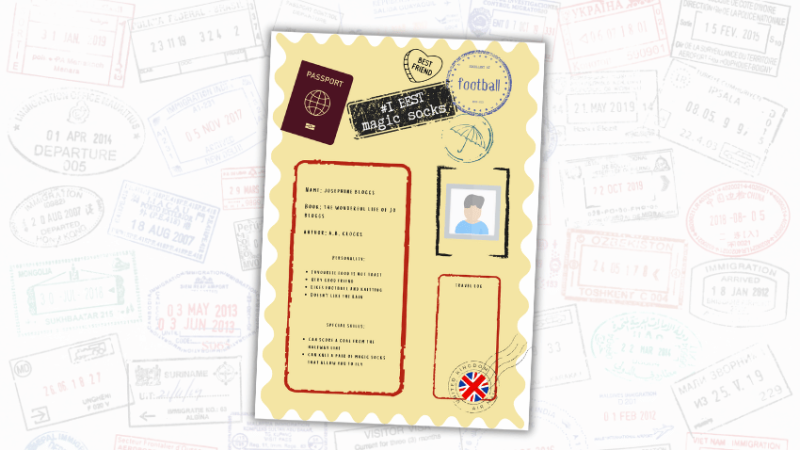Case Study – Rosendale Primary School’s Approach To New Ideas And Reflective Practice

Teachers at Rosendale Primary School are learning just as much as the children, says Jacob Stow… “Great staff are what schools live and die by; if you have fabulous teachers, you’re going to have great learning. Your biggest challenge as a leader is to get and keep them – and one of the ways I […]
- by Jacob Stow
- Former editor of Teach Early Years and Top School Trips magazines

Teachers at Rosendale Primary School are learning just as much as the children, says Jacob Stow…
“Great staff are what schools live and die by; if you have fabulous teachers, you’re going to have great learning. Your biggest challenge as a leader is to get and keep them – and one of the ways I try to do that here is by making it such a brilliant place to work, a place that gives you so many opportunities, that you don’t want to go anywhere else…” So says Kate Atkins, headteacher at Ofsted ‘outstanding’ Rosendale Primary School in Lambeth, and the opportunities she mentions don’t include ‘taking it easy’. At Rosendale, teachers are expected to be learning and improving just as much as the children. They’re expected to take risks and to embrace challenges. Engaging in research is regarded as imperative – and that means looking beyond the gates to practice in other schools, helping to drive improvement in the wider sector as well as closer to home. Needless to say, that also means a lot of hard work, but it’s a policy that appears to be working. Staff speak of the school, and the diverse range of projects they’re involved with, with the same, genuine enthusiasm Kate does; it seems a real destination of choice. The children, too, are impressed – with the myriad extra-curricular activities they get to choose from; the experiential learning they’re treated to in the classroom; the library bus parked in the playground. They’ve even got used to their school’s rejection of ability streaming (no more ‘top tables’) in favour of adopting Kagan Cooperative Learning. There’s a lot going on at Rosendale, but there’s a sense of fun about it all. “You spend a lot of time at school, so you should have a great time doing what you do,” Kate says, “That’s what I want the kids, and the staff, to experience here.”
1. Action research
“We dedicate a lot of our budget to making sure teachers have time to learn,” Kate tells us. As we speak, we’ve just come from talking to several members of staff and have heard the evidence of that for ourselves. “They work on their own research projects – we’re not demanding a particular outcome; we want them to take risks. Sometimes you test something and it doesn’t have the effect you thought it would – but there you go, you’ve learnt something.” For Kate, however, it’s a case of ‘do as I do’, not ‘do as I say’: “I do think there should be an expectation that as a headteacher you participate in research,” she continues. “I don’t have the time to do the in-depth research that academics would do, so I rely on their work. But I read widely around the subject – I think every educator should – and not just education books either but also about leadership and learning in a broader sense.” Her current title? “Deliverology 101 by Michael Barber – it’s not really a bedtime read!” “As a school, research is important. You don’t want to be slavishly following someone else’s ideas,” she says, “and academics aren’t in a classroom day in, day out. You have to find out what works for you. It’s fine for these studies to say ‘metacognition makes a big impact on learning’ – but how do you put that into practice? When you walk into great classrooms with great teachers, you can see that understanding about learning, and that teaching about learning, is happening, but it’s what you do to put that into a structure that can be applied by all teachers in all lessons that’s important. And that’s what the ReflectED project is all about.”
2. The language of learning
ReflectED is a big deal at Rosendale [PDF] and further afield. It’s an ongoing research project, funded by the Education Endowment Foundation; an ‘Approach to learning that teaches and develops children’s metacognition skills’ with the aid of the cloud-based Evernote platform. Pupils are taught to reflect on their learning, and then how to record their reflections – be it as written notes, digital photos or audio recordings. Their work can then be tagged with these reflections, resulting in an easily searchable compendium of observations to help them as they progress. Emerging from a broader, early years-inspired desire to promote talk and allow children to take ownership of their learning – something that permeates the school (see panel) – the project has been running for around four years. “It started with a conversation around assessment for learning, and how you can capture all those great moments that aren’t recorded in books. That’s a very early years perspective because nothing goes on in books in nursery, but there’s so much that needs to be evidenced,” Kate says. “We also wanted to have a system that absolutely involved children. “Years ago I saw Dylan Wiliam and Shirley Clarke talk around target setting, getting kids to set their own targets. I did a lot of that in my classroom and could see what a difference it made, so I wanted to try and develop that kind of system.
‘As we worked with it, we started to think, hang on – when you’re having these kinds of conversations with the children as they’re reflecting, what you’re doing is metacognition. You’re teaching them about learning. The problem is a lot of them don’t have access to the vocabulary to do that effectively. “With ReflectED, what we’re trying to do is give children the vocabulary to describe what they’re doing and how they are learning. It ties in to the idea of fixed mindset and growth mindset, that there’s no such thing as being ‘gifted’ – that it’s about practice and persistence,” Kate explains. “It’s developed a lot over time. Today, we run a system of performance tagging by colours. You’re either red – ‘I don’t get this at all’; yellow – ‘I’m going to need a bit of help’; green – ‘I’m OK, but I need more practice’; or blue – ‘I can do this, and I can coach somebody else’. That’s a common vocabulary we have all the way through the school and the kids understand it. “I was watching a literacy lesson in Y1, and the teacher brought the children together on the carpet before doing some paired work. She said, ‘I want you to think about where you are. What’s your colour?’ One little girl put down green and went off to do some independent work. When the children came back to the carpet, the teacher asked them how they’d got on, and this little girl thought and said, ‘I was yellow. I thought I was green, but I found it really hard and I needed some help. I need more practice and I hope can do some more.’
For me that’s an example of putting early years practice into the rest of the school. It’s about children saying to the teacher, ‘I want to do this now. I know what I need to do to become a more successful learner.’” How much of a difference is ReflectED making? Over the last year the approach has been trialled in 30 two-form entry schools across the country. Restricted to Y5, the project has involved one half of each cohort taking the ReflectED approach, and the other half sticking to more traditional methods. At the project’s imminent end, all of the children will take online CEM tests to rate their attitude to learning, reading skills and maths, and all will be revealed. “We talk about the results not mattering, but I will sulk a bit if it doesn’t work!” Kate admits. However, she points to the opportunities the project has afforded staff and school, regardless of the outcome. “We’ve got 14 members of staff who are ReflectED trainers and have gone out into these 30 schools and supported the teachers, delivered lessons and run training sessions – they’ve been involved in a national research project.
‘We’ve made links and met great teachers and heads in such challenging circumstances. Maybe there’ll only be a handful of kids out there to whom we’ve made a difference – but if so, I’ll be happy because it’s about improving children’s lives.”
3. Big in Japan
ReflectED isn’t the only example of action research at Rosendale. The school has forged links with the Institute of Education (IOE), which have led to a project into Lesson Study, an approach to teacher development from Japan. “You start off by looking at the data to see what’s lacking in your class,” Kate explains. “Perhaps you think children are having problems applying their maths skills to word problems. This becomes your focus. You then plan a lesson with a team of people, so everyone is responsible for its content.
Next, one person teaches the lesson while the others just observe the children. Afterwards you meet again and talk about what has been observed, and very specifically – for example, ‘Clive was looking out of the window up until the point you said this, then he turned back to his work.’ “It’s not about judging the teacher or the lesson,” she stresses. “It’s about sharing expertise. You talk about precisely what the kids did, what their ‘lightbulb moments’ were, where their barriers to learning came. As a result of that you then plan another lesson together to address these issues. You repeat the process three times, with a different teacher teaching the lesson each time. “It’s about developing your practice – looking at what you do within a classroom, highlighting those things that you don’t even realise you’re doing, for good or for bad.” Again, participation in the project has meant exciting opportunities for Rosendale staff. In the first year, the IOE trained 15 teachers in Lambeth to be lead Lesson Study practitioners; in the second, those teachers are working with a range of schools and Rosendale, with the IOE’s help, is training a new cohort. Sticking with the Far Eastern theme, Rosendale is also putting a lot of effort into teaching its children Mandarin. It holds ‘Confucius Classroom’ status, bestowed by the IOE’s Confucius Institute – an initiative set up by the Chinese government to promote cultural links for support and training. “We have a couple of children in Y5 who have been studying Mandarin since the early years. If you close your eyes, you can almost believe they’re native speakers their accents are so good!” Kate tells us. Again, there’s research involved: “We ran our own project last year within foreign languages, French as well as Mandarin,” Kate says. “My belief was that children would do much better if they had 15–20 minutes of language learning every day, rather than 45 minutes a week. We tested it and it made a great difference, so that’s what we do now.”
Early influences
Kate has worked at Rosendale since 2003, having been appointed head of school in 2010 before stepping up to substantive head in 2013. She points to her background in early years as a major influence on her vision of primary education: “Early education is very different to primary and secondary education, as a rule,” she explains. “It’s about experiential learning; the children are doing things – it’s hands on and self-directed, and there’s lots and lots and lots of talk. Everything is about creating a language-rich environment, developing their vocabulary.” Projects such as ReflectED and Kagan Cooperative Learning feed into making this philosophy a reality throughout the school, into generating “A body of young people who are active and participate in their learning, who have a great desire to learn,” as Kate puts it. She also highlights Rosendale’s rejection of ability streaming, again, linked to Kagan’s requirement for mixed ability groups – “If there’s one thing that I had to say I was most passionate and proud about, it would be that,” she says.
Meet the staff
Esther Gee, Phase Leader – Y3 and Y4

“We have metacognition lessons as part of the ReflectED project, which teach children about learning. For example, each year we get the children to learn a new skill that isn’t based on the curriculum – cooking, knitting, tying your shoelace, etc. We talk about the frustrations and success they have and how they can find help for things. It’s made a huge impact on learning.”
Rosie Unwin, Y6 Teacher

“I’ve run a debate club for the last three years. The number of skills it gives the children is phenomenal – the idea that speaking in public isn’t problematic; learning that you can argue something even if you disagree with it. You can see it in their literacy as well. The children have been to the Debate Mate national finals every year, so I’m very proud of them!”
Justine Paton, Curriculum Leader ReflectED

“Using Evernote has been really effective. We can search for, say, ‘maths, fractions, red’, and it will tell us which children are struggling. It’s also helped children adopt a growth mindset. By using reflections, they figure out why they can’t do maths; they work out what they need to learn. They find a way out of that ‘I’m rubbish at it’ mindset.”
Ian Herlihy, Nursery Teacher

“Everyone is running their own research project. I’ve got a couple of children whose language skills are quite poor, so I’ve been looking at how I can help them improve. We had someone from the IOE come in and advise us on carrying it out, and we’ve had staff meetings where we’ve helped each other to evaluate our work, too. There’s a lot of support.”
Pupil voice
Rubin , Y6 “I was struggling with ‘I’ and ‘me’ – which to use and when. I was reading a book about it that helped me, so I wrote the information down in an Evernote; Now I can look back on it whenever I need to.”
Malakai, Y6 “At debate club they give us a subject to argue, like ‘Should video games be banned?’ and there’s a proposition and opposition. A lot of people go, so we have an A side and a B side – you need to learn to express yourself.”
Raffi , Y6 “I do magazine club – because we’re Year 6, we edit and write the articles, and decide what should be in each issue. Pupils in Y4 and Y5 do the puzzles and jokes. It’s good to be in charge!”
Olivia, Y6 “Using Evernote is easy, once you get used to it. There’s an iPad per table, so you can take a picture of your work and then write a reflection. We write about what we’ve done and what we could improve on.”
For more information, visit www.rosendale.cc or follow @RosendaleSchool







